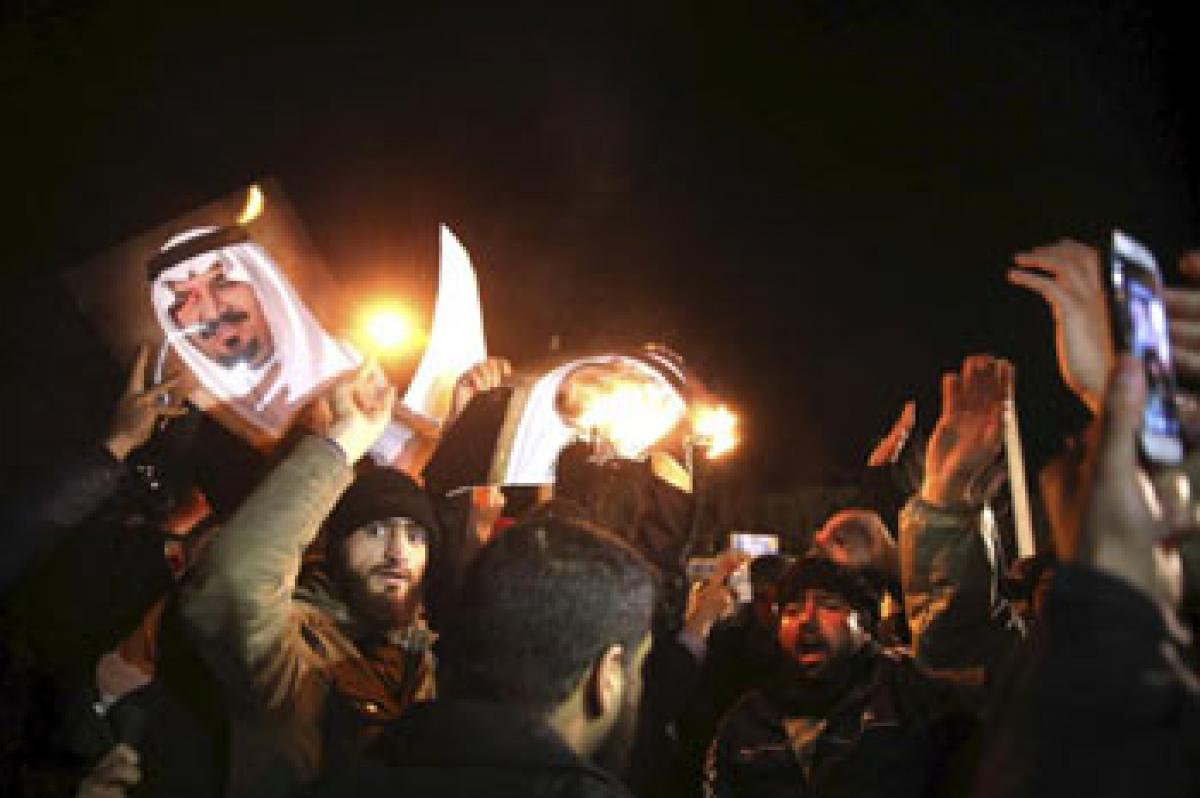Live
- ‘Daaku Maharaaj’ to kickstart musical promotions
- ‘Game Changer’ team teases with a new promo
- Nara Lokesh emphasises overhaul of govt. schools and mid-day meal program
- Amid turmoil, air pollution peaks in Bangladesh as temperatures fall
- Google Trends unveils list of most searched ‘Indian Movies of 2024’
- BGT 2024-25: Hazlewood signals readiness for Brisbane Test after training with full run-up
- Google Presents Deep Research AI Tool for Comprehensive Web Reports
- Share of top 50 stocks to total market cap at all-time low: Report
- Nortje ruled out of SA’s remaining white-ball matches against Pakistan
- Mamata doesn't want INDIA bloc to succeed, claims BJP's Rahul Sinha
Just In

Iranian protesters stormed the Saudi Embassy in Tehran on Sunday as Shiite Muslims reacted with fury to Saudi Arabia\'s execution of Shiite cleric along with 47 others.
 Saudi faces divine revenge: Khamenei
Saudi faces divine revenge: Khamenei
The incident also triggered angry reactions from Iraqi leaders and clerics. They demand closure of Saudi Embassy in Baghdad, which was reopened recently after two decades of strained diplomatic ties between two nations
Tehran: Iranian protesters stormed the Saudi Embassy in Tehran on Sunday as Shiite Muslims reacted with fury to Saudi Arabia's execution of Shiite cleric along with 47 others. Demonstrators protesting against cleric Nimr al-Nimr's execution broke into the embassy and set it on fire before being cleared away by the police.
- Protestors ransack, set fire to Saudi Embassy in Tehran
- Angry Iran summons Saudi envoy
- Saudi, Iran accuse each other of supporting “terrorism”
Meanwhile, Iran’s supreme leader, Ayatollah Ali Khamenei, has renewed his attack on Saudi Arabia, saying that politicians in the Sunni kingdom would face ‘divine vengeance’ for his death. “The unjustly spilled blood of this oppressed martyr will no doubt soon show its effect and divine vengeance will befall Saudi politicians,” state TV reported Khamenei as saying on Sunday.
Iran's top leader on Sunday warned Saudi Arabia of "divine revenge" over the execution of an opposition Shiite cleric while Riyadh accused Tehran of supporting terrorism, escalating a war of words hours after protesters stormed the Saudi Embassy in Tehran. Saudi Arabia announced the execution of Sheikh Nimr al-Nimr on Saturday along with 46 others, including three other Shiite dissidents and a number of al-Qaida militants.
Al-Nimr was a central figure in protests by Saudi Arabia's Shiite minority until his arrest in 2012, and his execution drew condemnation from Shiites across the region. Iran's Supreme Leader Ayatollah Ali Khamenei condemned the execution on Sunday in a statement on his website, saying al-Nimr "neither invited people to take up arms nor hatched covert plots. The only thing he did was public criticism."
Saudi Arabia's Foreign Ministry said that by condemning the execution, Iran had "revealed its true face represented in support for terrorism." The statement, carried by the official Saudi Press Agency, accused Tehran of "blind sectarianism" and said that "by its defence of terrorist acts" Iran is a "partner in their crimes in the entire region." Al-Nimr was convicted of terrorism charges but denied ever advocating violence.
Sunni Saudi Arabia and Shiite Iran are locked in a bitter rivalry, and support opposite sides in the wars in Syria and Yemen. Iran accuses Saudi Arabia of supporting "terrorism" in part because it backs Syrian rebel groups, while Riyadh points to Iran's support for the Lebanese Hezbollah and other Shiite militant groups in the region.
The Iranian Foreign Ministry has summoned the Saudi envoy in Tehran to protest, while the Saudi Foreign Ministry later said it had summoned Iran's envoy to the kingdom to protest the critical Iranian reaction to the sheikh's execution, saying it represented "blatant interference" in its internal affairs.
In Tehran, the crowd gathered outside the Saudi embassy early on Sunday and chanted anti-Saudi slogans. Some protesters threw stones and Molotov cocktails at the embassy, setting off a fire in part of the building, said the country's top police official, Gen Hossein Sajedinia. He later said police had removed the protesters from the building and arrested some of them, saying the situation had been "defused."
The cleric's execution could also complicate Saudi Arabia's relationship with the Shiite-led government in Iraq. The Saudi embassy in Baghdad reopened for the first time in nearly 25 years on Friday. Already yesterday there were public calls for Prime Minister Haider al-Abadi to shut the embassy down again. UN chief urges calm, says he is “deeply dismayed” United Nations (AFP): UN chief Ban Ki-moon said he was "deeply dismayed" by Saudi Arabia's execution of 47 people including a prominent Shiite cleric.
Deploring the violence outside the Saudi embassy in Tehran, he called for "calm and restraint" and urged "all regional leaders to work to avoid the exacerbation of sectarian tensions," his spokesman said in a statement. "Sheik al-Nimr and a number of the other prisoners executed had been convicted following trials that raised serious concerns over the nature of the charges and the fairness of the process," Ban's spokesman said.
The UN leaer had raised Nimr's case "with the leadership of the Kingdom of Saudi Arabia on a number of occasions," the statement added. Ban was quoted as restating "his strong stance against the death penalty." "He points to the growing movement in the international community for the abolition of capital punishment and urges Saudi Arabia to commute all death sentences imposed in the kingdom."

© 2024 Hyderabad Media House Limited/The Hans India. All rights reserved. Powered by hocalwire.com







